If you run a website or online business, you likely already try to keep up with trends in web design, development, and marketing. But are you also up to date on the latest SEO trends of 2020?
Do SEO tactics really change that often? The Google search algorithm actually updates every day! While the essentials remain relatively constant, keeping up with the trends can give you an edge on the thousands of websites only employing basic SEO tactics – or less.
As search engines update their code and strategies emerge to take advantage of the new features, you’ll need to stay on top of things to have any chance of fighting your way to the top.
Keep an eye on these most important SEO trends of 2020, and learn new ways to grow your ranking or avoid being penalized for outdated practices.
1. Voice Search
By 2020, 50% of all online searches will be voice searches. Voice assistants have popped up everywhere: phones, computers, and houses through Google Home and Amazon Alexa.
People are speaking out loud when searching with Google. This has a major impact on the wording of the most popular keywords. “Restaurants near me” is still the highest-ranking search of that kind, but long-tail keyword versions are becoming more and more common. “Where are restaurants in this area,” “restaurants near where I’m at now,” and similar variants are very common.
Before, when every query had to be manually typed, searches tended to be sentences fragments, as short as possible. Now, searches reflect conversational speaking tone and the wording used while talking out loud. The keywords you previously used to target are used less and less.
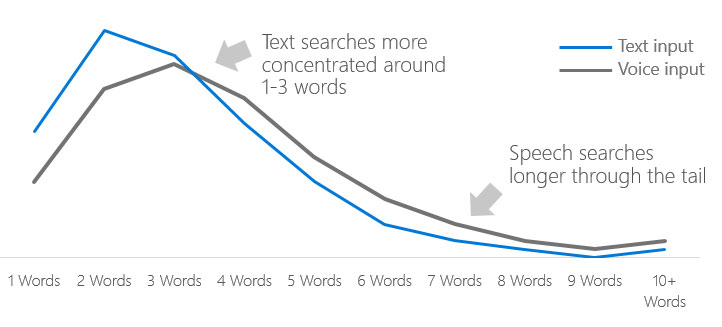
Topics Over Keywords
With long-tail keywords rising in use, traditional methods of keyword targeting are becoming somewhat obsolete. While before a keyphrase like “best restaurants in New York” was possible to incorporate into an article or page to gain extra clicks, it’s very difficult to naturally include long-tail, conversational keywords in content.
So is it impossible to grow now? Is content marketing dead? Is keyword research no longer important?

The answer to all of those is of course no. You should still be doing keyword research. Keywords are still a major ranking factor after all, and content marketing is just as important as ever. Plus, any strategy is better than none.
But now, instead of pushing out tons of articles covering as many keywords as possible, you should focus on writing things that are valuable. Answer questions, accurately address user intent, and grow your authority in the industry. In this new era of SEO, value and quality will be far more important than sheer amount of content.
For more tips on how to optimize for voice search, check our detailed article on that topic.
2. BERT and E-A-T
In October 2019, Google released their new search engine algorithm, BERT – and it’s smarter than ever. The neural network is vastly better at grasping the meaning behind these long-tail conversational queries. It also no longer grapples with prepositions or context.
For content creators, this isn’t as revolutionary a change as you might expect. There’s no definitive list of ways to optimize for BERT and much of the information out there is inaccurate. But what BERT does do is reward those who are already creating well-written, quality content. Especially that which targets mobile users. And it makes optimizing for user intent even more important. Now’s the time to examine your long-tail keyword strategy.
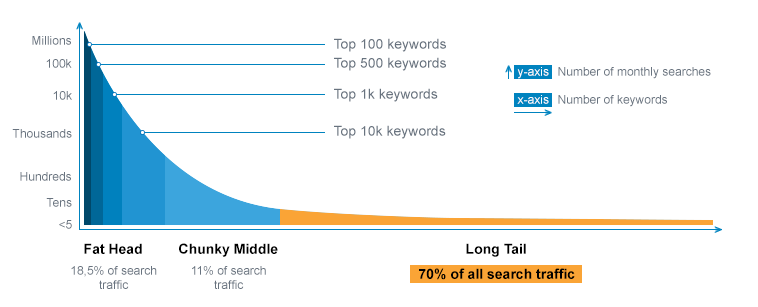
Though the E-A-T algorithm update is from 2018, it continues to majorly impact rankings and content marketing strategies. E-A-T stands for Expertise, Authoritativeness, and Trustworthiness. It’s a ranking factor that prioritizes high-quality content written by professionals. It especially impacts critical fields like health and medicine (though everyone is subject to it).
Therefore, make sure to have well-known experts behind the content you create, and to make your authors’ credentials clear. Articles should be sourced well, and you’ll notice a big increase once you make your way into the press and establish a name for yourself. Focus on link-building so Google recognizes you as an important entity in your industry.
3. Video Content
Video content is more important than ever before for marketers. Consumers are ravenous for videos; whether funny, informative, or helpful, if your content clicks with users you could see insane results – like an 88% ROI.
And it’s not just important for marketing. Google is prioritizing video in many searches. So much so that there are sometimes no organic website results above the fold. Try a search like “how to paint” and you’ll get a huge YouTube clip that takes up half the screen – followed by a video carousel! Posting on Youtube could be a good way to launch yourself into the search results.
Breaking into video isn’t easy, so here are some quick tips on how to nail it:
- Pick the types of videos you want to create and research how to do them effectively. Advertisements, how-tos and tutorials, vlogs, entertaining videos… The list goes on.
- Decide on a target audience, and study the kinds of content they’re interested in.
- Keep it short to start. A five-minute video will perform much better than a twenty-minute one.
- Definitely post on YouTube, but look out for other social media like Twitter and Snapchat you can capitalize on.
- Figure out what makes you unique. Video marketing is saturated with brands, and people need a little extra from you to keep them engaged.
- Include a call to action in your videos reminding people to follow you, click, or share.
- Don’t be afraid to start, even if you have a small budget. Do what you can. You can get a lot out just by putting a little in.
4. Mobile-First Design
It should be no secret by now that mobile-first design must be a priority for all websites, no matter how small. Fewer and fewer people browse the internet on their computers. Instead, they take to their handheld devices to find what they’re looking for, an SEO trend that will continue in 2020.
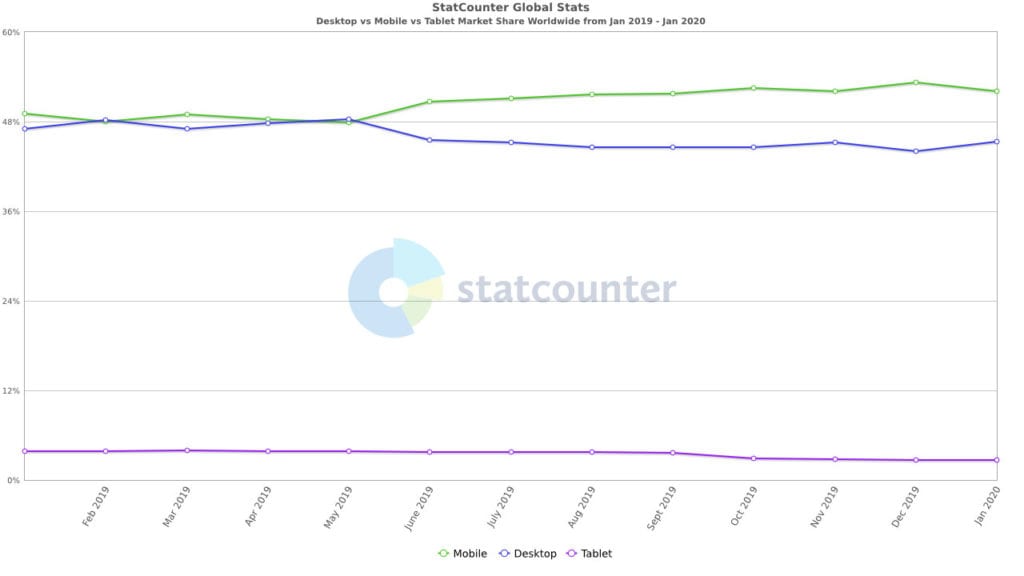
It’s no longer just having an impact on your bounce rate and satisfaction of mobile visitors; it’s impacting your SEO as well. With major algorithm changes like Mobilegeddon, intrusive interstitials, and the rise of conversational keywords, continuing to target only computer users will be your website’s downfall (if it hasn’t destroyed your rankings already).
But it’s not just about making your website responsive after the fact. Mobile-first design means being proactive and keeping mobile’s unique design needs in mind. This starts from the planning stage: avoid popups or other difficult-to-navigate elements, remove sidebars and other content that may disappear on smaller devices, and make sure everything scales perfectly no matter the screen size.
You should also research the type of queries mobile users make on their phones, and how they tend to browse sites. Both will impact what type of content you put out and your site’s design.
5. Featured Snippets
If you commonly use Google, you’ve probably noticed the featured snippets already. These results are the focus of the page, with icons, images, and unique formatting that makes them seriously stand out. This new layout is having a big impact on SEO.
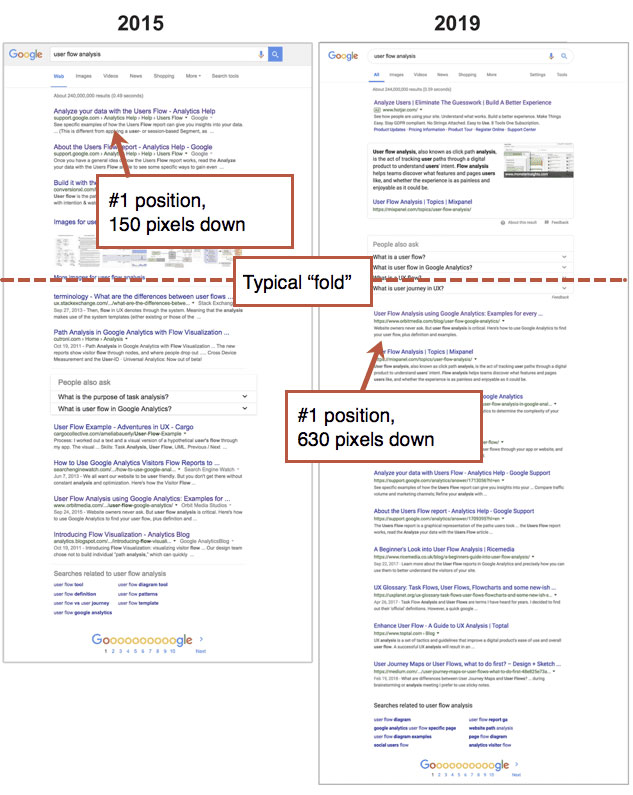
Examples of featured snippets include local business listings, the answer box, video carousels, and results like recipes, ratings, and products. If you want to get those clicks, you’ll need to put in the work to optimize for the rich results.
Implement schema markup on every page it’s appropriate. While just having it in place won’t automatically show a rich result for every search, it’s still well worth the effort. Try to write high-quality, concise content to get into the answer box. And remember that many voice searches have local intent, so be sure to add this information to your business website.
Organic Search Results are Disappearing
With featured snippets, video carousels, and advertisements taking up so much space, trying to rank organically can seem like a fruitless task. If you’re not in the first few search results, your chance of getting clicks will sharply shoot down.
And now, over half of all Google searches end with zero clicks. People finding their answers in the new answer box snippet and closing the tab is one of the more unfortunate SEO trends in 2020.
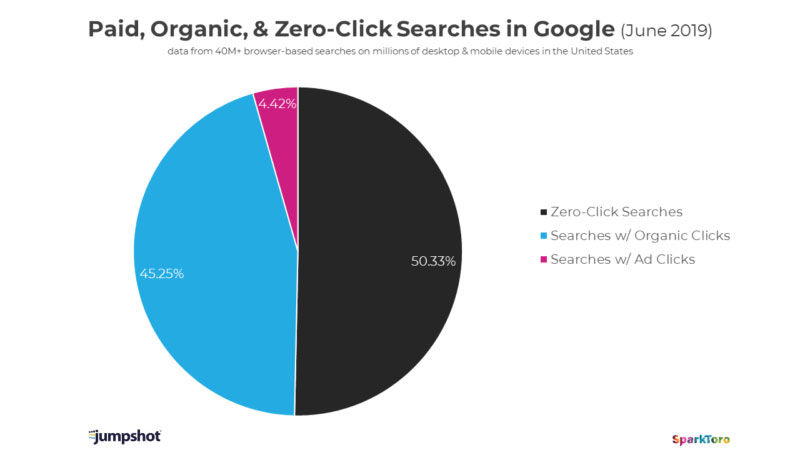
Organic traffic is still very much possible, but it’s evolving. Working on getting into the rich snippets and earning that coveted answer box spot are going to do a lot for your CTR. And advertising in Google search results is also more lucrative now, since it can earn you a better spot on the page.
Remember to claim your company’s knowledge panel. When people search up your company and the info box appears, you’ll want to make sure everything is accurate and you have contact info listed.
And as mentioned before, focus on targeting less common topics and long-tail keywords that are unlikely to be full of all this extra clutter. Featured snippets appear more often on high-traffic searches.
6. Engagement
Improving organic click-through rate should be a big priority, and it definitely has an impact on SEO. But the types of visitors who only stick around for five minutes to skim one article aren’t going to be the ones majorly affecting your ranking.
Engagement metrics are where it’s really at. One of the main tasks of RankBrain is to track how searchers interact with their results. This includes time on site, bounce rate, social shares, dwell time, and even comments. All of these affect your rankings.
Pure traffic is great, but even better is convincing users to browse multiple pages, stay for longer on your website, or engage with you directly by leaving a comment and sharing on social media. Social media does have an indirect effect on SEO, leading to more backlinks and better ranking.
Your goal should be to increase user engagement and retention in as many areas as possible. A good content marketing and social media strategy will go a long way towards improving your SEO and getting you those high-quality links.
Influencer Marketing
Link building is an old SEO practice, but new trends always come in to spice it up a bit. The latest is influencer marketing, which involves getting endorsements from leaders in an industry or community.
Influencer marketing tends to exist on image- and video-driven social media. This includes Instagram, YouTube, Snapchat, Twitch, and TikTok. And it mostly focuses around businesses like fashion, entertainment, gaming, tech, and beauty.
But you can find influencers for any field, on any platform. Every industry you can imagine has a few blogging influencers you can work with to create sponsored posts for your brand, or an active social media advocate on traditional social sites like Twitter or Facebook.

This is a great way to build authority by connecting with those who already have it. You can get attention from the followers who trust them and in turn earn more user engagement on your site and on social media.
It’s very similar to affiliate marketing, which is another great way of building link authority (and monetizing your site). But influencer marketing is the biggest new trend in SEO. If you can work with an advocate that fits your brand and helps spread your message, you may find favorable results compared to other forms of social media marketing.
Keeping Up With SEO Trends in 2020
Everyone always focuses on trends in web design, development, and content marketing. Yet, it’s just as important to keep an eye on SEO trends. While major overhauls like the removal of meta tags or the “Mobilegeddon” update tend to be rare, there are still small changes being made every single day. Staying on top of it will give you an edge.
Content – especially video content – is still a big focus. But companies going forward should focus less on creating a bunch of articles for every keyword they want to rank for, and more on adding value to their industry topic. The methods are similar, but the philosophy is very different.
You’ll also need to increase engagement, and keep in mind that voice search and mobile users are rapidly affecting how keywords work and which ones rank best. Big changes are coming, and you’ll need to be ready for it.
Do you have your own SEO predictions for this year? Let us know what you think is coming in the comments.

2 Comments